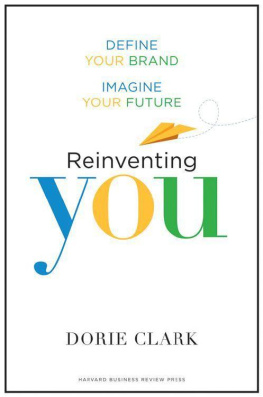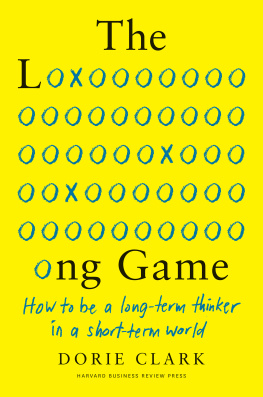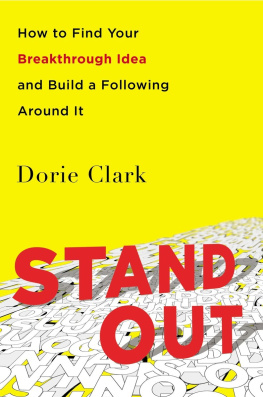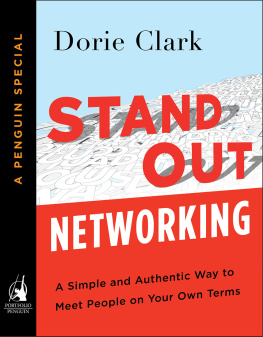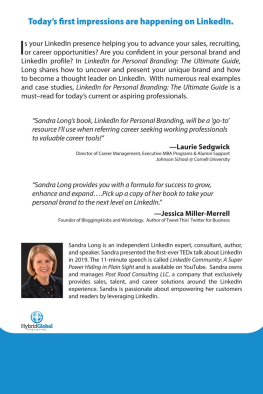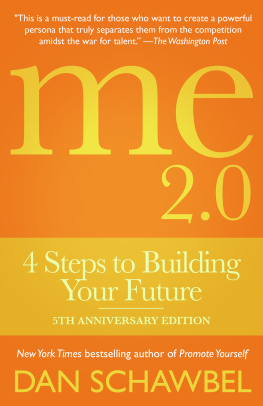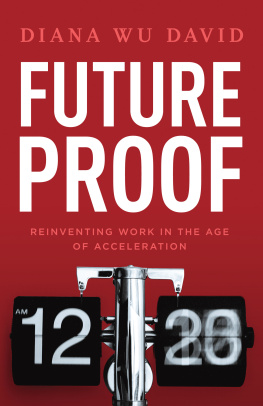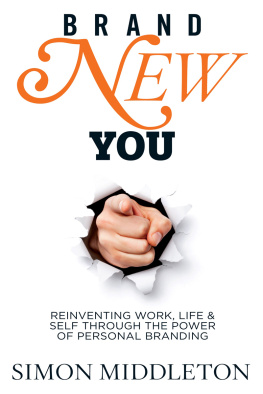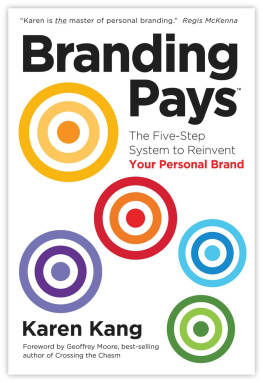Advance Praise for Reinventing You
As the corporate ladder morphs into a corporate lattice, where there is no single climb toward career success but rather a multiplicity of ways to grow, personal branding becomes your calling card. Reinventing You presents effective ways to help you develop your brand proposition.
Cathy Benko, Vice Chairman, Deloitte LLP; best-selling author, The Corporate Lattice: Achieving High Performance in the Changing World of Work
The days of reliable, lifelong careerscomplete with pension and gold watchare over. With Dorie Clarks clear, practical, step-by-step approach to reinvention, the reader comes to see this fact not as daunting, but rife with opportunity and possibility. Enriched with riveting examples from the worlds of business, politics, and nonprofits, this indispensable guide will help you take control of and shape your professional life.
Meg Cadoux Hirshberg, author, For Better or For Work: A Survival Guide for Entrepreneurs and Their Families
Necessity may still be the mother of invention, but todays relentlessly changing world necessitates reinvention, sometimes sequential reinvention. I can think of no better guide through that daunting process than Dorie Clarks wonderfully readable and informative book.
Robert Cialdini, author, Influence: The Psychology of Persuasion
Reinventing You is a must-read for anyone who wants to expand their career horizons and become more authenticin work and in life.
Chip Conley, author, Emotional Equations: Simple Truths for Creating Happiness + Success; founder, Joie de Vivre Hospitality, Inc.

Copyright 2013 Dorie Clark
All rights reserved
No part of this publication may be reproduced, stored in or introduced into a retrieval system, or transmitted, in any form, or by any means (electronic, mechanical, photocopying, recording, or otherwise), without the prior permission of the publisher. Requests for permission should be directed to , or mailed to Permissions, Harvard Business School Publishing, 60 Harvard Way, Boston, Massachusetts 02163.
First eBook Edition: April 2013
ISBN: 978-1-4221-4413-8
For my mother, Gail Clark, with love
Contents
Are you where you want to be professionally? Whether you want to advance faster at your company or change jobs or even careers, one thing is clear: no one wants to spend a lifetime doing a job they hate. To succeed in todays competitive job market and build a career that leverages your unique passions and talent, its almost certain that at some point youll need to reinvent yourself professionallyand ensure that others recognize the powerful contribution you can make.
After all, its clear that the era of gold watches and lifetime employment is over. How many people do you know who are lifers at a company? For better or worse, people today skip around professionally, forced by layoffs or seeking a better title or salary. Even for those who would have wanted to make a career at one company, the options are limited. Harvard Business School Professor Thomas DeLong attributes this, in part, to a precipitous decline in professional mentorship over the past several decades. As senior executives were forced to take on increased responsibilities, they stopped making time to cultivate rising talent. The result, says DeLong, is executives who start to be suspicious about the organization and see themselves as free agents rather than saying, I can stay at this firm for the next thirty years. Rapid job turnover has now become standard.
Even if they stay with the same company or industry, professionals still need to reinvent themselves to keep up with the rapid pace of corporate change. How are you adapting and approaching your next reinvention curve? asks Steven Rice, the executive vice president of human resources at Silicon Valley powerhouse Juniper Networks, of job applicants. How are you staying relevant and competitive? People have to reinvent themselves to fit into the new context of work.
Amid this new landscape of frequent job and career changing, people are increasingly working later in life. Sometimes thats due to preference, and sometimes to necessity. (Between the recession years of 2007 and 2010, the number of working Americans fifty-five and over grew by nearly 8 percentthe only group whose workforce participation rates increased.) That means even more opportunities, or requirements, to reinvent yourself over the course of your career.
The lengthening careers of baby boomers also have an impact on their kids, millennials struggling to find their way in the workforce and hitting a wall of more experienced candidates eager for the same jobs. In 2011, the percentage of employed young people hit a sixty-year low. If your early jobs dont reflect your desired future path, its essential to be strategic about how youre positioning yourself and your experience in order to maneuver to where you want to be.
As Henry Wadsworth Longfellow noted, we judge ourselves by what we feel capable of doing, while others judge us by what we have already done. So when youre a finance guy who moves into marketing, a venture capitalist who wants to become a career coach, or an executive trying to win a promotion to the next level, your path may make perfect sense to you, but that doesnt mean its clear to everyone else.
Reinvention, and overcoming past perceptions, can be a daunting process. Not everyone needs to rebrand himself professionally, of course. If you do have a long-term career at your company and are happy with your trajectory, you may not need to worry about it. But for many of us, that luxury doesnt exist.
This book is intended to help executives at all stages of their careers who want something different and better in their professional livesand know there has to be a more strategic way to do it. You may be struggling to find a toehold in an inhospitable economic climate, like Johnna, a young professional Ill profile later who was forced to bide her time with retail jobs instead of hopping on the career fast track. You may be facing a crisis in your industry thats forcing you to consider new options, like Tom, who was laid off after more than two decades as a newspaper reporter. You may, like Dan, have to fight back against misconceptions about you in order to succeed at your company. You may be looking to build new skills and explore new interests, like Karen, a corporate attorney who realized she desperately needed a change. This book is an invitation to ask what you want out of life.
When Should You Reinvent Yourself Professionally?
- Youre at a new phase in life and you want to be known for something different.
- Youve been laid off and need to ensure youre in the best position possible to land a new job quickly.
- You want to move up in your company, and you need to take control of your reputation.
- Youve been trying to win a promotion, but feel youre being held back by misconceptions about what youre capable of.
- Youd like to move into a different area of your company, perhaps from legal to human resources, or from sales to finance.
- Youre just starting out in your career and havent built up a powerful rsum yet, so you need to find another way to stand out.
- Youre changing careers and need to make a compelling case that your unusual background is an asset, not a liability.
The Perils of Reinventing Your Personal Brand
Hi Dorie, read the message in my inbox, from an executive Id been hoping to interview for this book. Id be happy to talk with you, but Id prefer to remain anonymous. Im afraid it might hurt my personal brand to be seen talking about my personal brand! His message was only half-joking (I did eventually interview him), but it highlights an important truth. Again and again, as Ive talked about the book in business school classrooms and corporate boardrooms across the country, Ive heard from professionals who recognize the need to reinvent themselves, but still have qualms. Wont it look calculating to think too hard about my reputation? Shouldnt I just focus on doing good work?
Next page
